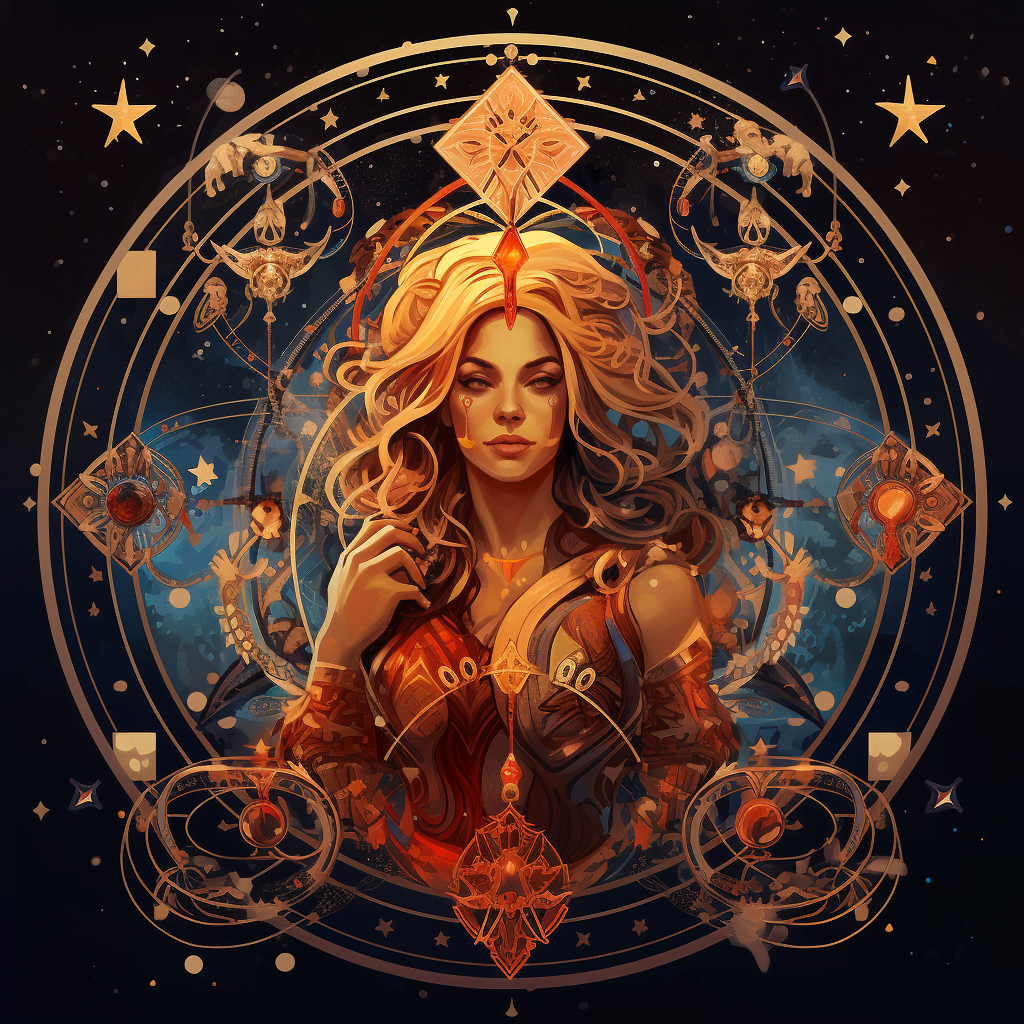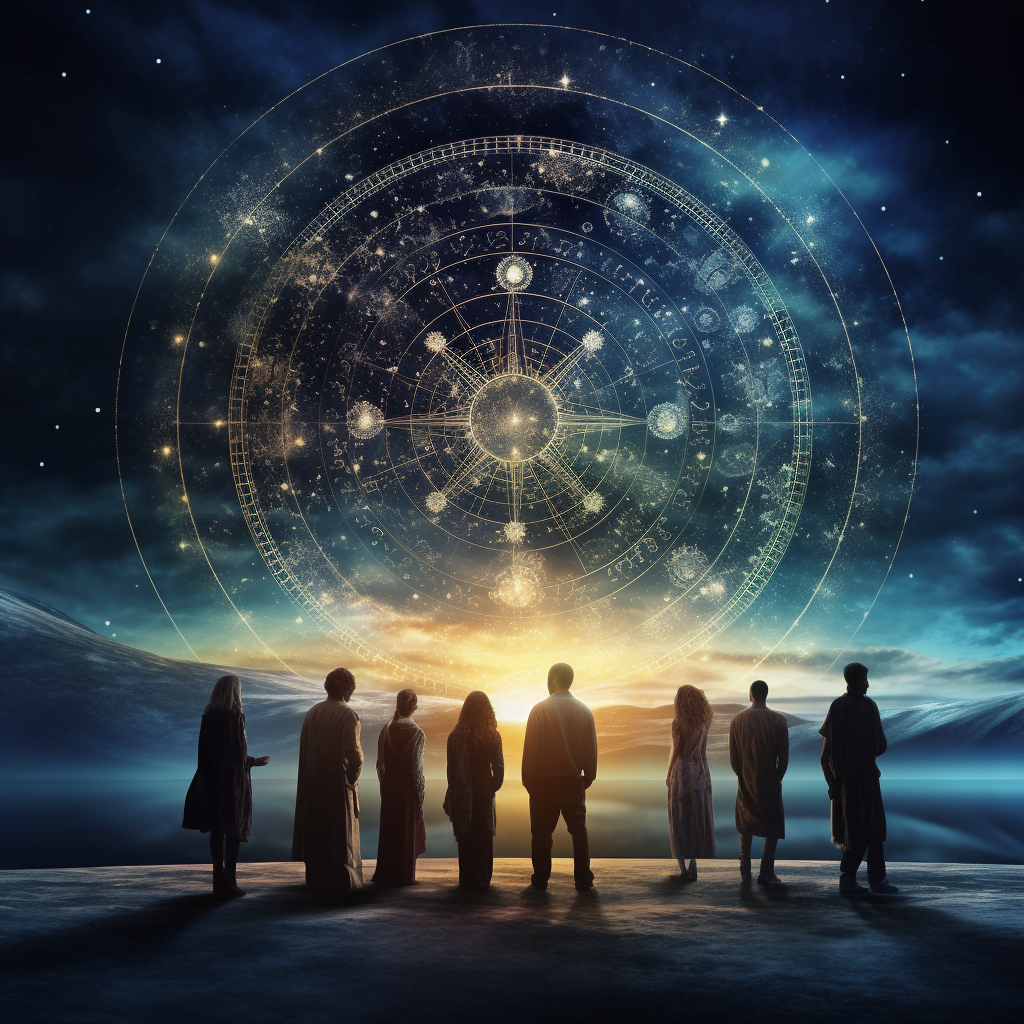The origins of astrology and the writing of the first horoscope have long fascinated scholars and enthusiasts alike. Dating back thousands of years, the practice of astrology and its link to the zodiac has influenced cultures all over the world. While the true author of the first horoscope remains a topic of debate, its creation is believed to have happened in ancient Mesopotamia, modern-day Iraq, where the earliest known records of celestial observations were made. This article investigates the longstanding question of who may have been the first to document the intricacies of the zodiac and create the foundation for horoscopes as we know them today.
The Origins of Astrology
Early Observations of Celestial Bodies
Astrology, the study of the movements and positions of celestial bodies in relation to human life and events, has a long and fascinating history that dates back thousands of years. Early observations of the stars, planets, and other celestial bodies sparked the development of astrology in various ancient civilizations.
In the ancient world, people began noticing patterns and correlations between the movements of the stars and certain earthly phenomena. Early civilizations, such as the Babylonians and the Egyptians, made meticulous observations of celestial bodies and recorded their findings in order to understand and predict events on Earth. These ancient cultures believed that the motions of the planets and stars had a direct influence on human behavior and the course of events in the world.
Ancient Beliefs and Astrology
The belief in the influence of celestial bodies on human life was a prominent aspect of many ancient belief systems. For example, in ancient Mesopotamia, the Babylonians developed a complex astrological system that assigned different meanings and interpretations to the movements of various planets and stars. They believed that the positions of the heavenly bodies at the time of a person’s birth could reveal aspects of their personality, fate, and potential.
Ancient Egyptian civilization also embraced astrology as an integral part of their religious and cultural practices. The Egyptians attributed great significance to the movements of the sun, moon, and stars, and they believed that certain celestial alignments were connected to the fortunes and destinies of individuals and the kingdom as a whole.
Development of Astrological Systems
As ancient civilizations continued to observe and interpret the movements of the stars, astrology began to develop into more systematic and organized systems of knowledge. The Greeks, in particular, made significant contributions to the field of astrology.
The Greek philosopher and mathematician Pythagoras introduced the concept of the zodiac, dividing the celestial sphere into twelve equal parts, each corresponding to a specific constellation. This division formed the basis for the horoscope, a chart that depicts the positions of the sun, moon, and planets at the time of a person’s birth.
Later, Greek astronomers such as Hipparchus and Ptolemy further refined astrological systems by mapping the movements of celestial bodies more accurately and developing mathematical models to predict future positions. These advancements laid the foundation for the modern practice of astrology.
The Birth of Horoscopes
The Babylonian Influence
One of the earliest known instances of horoscopic astrology can be traced back to ancient Babylon. The Babylonians, renowned for their advancements in astronomy and mathematics, developed a system where they recorded the positions of the planets and constellations at the time of a person’s birth. By interpreting these positions, priests and astrologers could provide insights into an individual’s personality traits and potential future events.
The Babylonians used clay tablets to record these celestial observations, and these early horoscopes were primarily written in cuneiform script. While much of the knowledge of Babylonian astrology has been lost over time, the surviving texts offer valuable insights into the origins of horoscopic astrology.
Hellenistic Astrology and Horoscopes
Horoscopic astrology, as we know it today, reached its pinnacle during the Hellenistic period in ancient Greece. Influenced by Babylonian and Egyptian astrology, Greek scholars like Ptolemy and Thrasyllus focused on creating detailed horoscopes based on the positions of the planets and the twelve segments of the zodiac. These horoscopes aimed to provide individuals with a comprehensive understanding of their personality traits, abilities, and potential future events.
These Hellenistic astrologers believed that the celestial bodies held symbolic meanings and influenced various aspects of human life, including relationships, career, and health. The interpretations of the planets’ positions in a horoscope were based on complex systems of rulerships, aspects, and house placements. This rich and intricate astrological tradition laid the foundation for the development of Western astrology.
Horoscopic Astrology in Ancient Greece
During the Hellenistic period, astrology gained significant popularity in ancient Greek society. Horoscopic astrology became embedded in the culture, with individuals seeking guidance from astrologers before important events or making important decisions. Astrologers themselves became highly regarded and were often considered advisors to kings and rulers.
Astrological texts from this period, such as the writings of Vettius Valens and Antiochus of Athens, offer detailed explanations of the techniques and principles used in horoscopic astrology. These texts not only provided guidance on interpreting horoscopes but also offered insight into the philosophical and metaphysical underpinnings of astrology.
Ptolemy and the Tetrabiblos
Claudius Ptolemy and His Contributions
One of the most influential figures in the history of astrology is Claudius Ptolemy, a Greek mathematician, astronomer, and astrologer who lived in the second century CE. Ptolemy’s work titled “Tetrabiblos” is considered a seminal text in Western astrology.
Ptolemy’s contributions to astrology are twofold. Firstly, he synthesized and organized the astrological knowledge of his time, drawing from the works of earlier Greek, Babylonian, and Egyptian astrologers. Secondly, Ptolemy introduced a systematic approach to interpreting horoscopes by outlining the principles of planetary rulerships, aspects, and house placements.
The Tetrabiblos has had a lasting impact on astrology, becoming a foundational text that has been studied and referenced for centuries. Ptolemy’s emphasis on the importance of understanding the positions and relationships of the planets in a horoscope set the stage for subsequent developments in Western astrology.
The Tetrabiblos: The Foundation of Western Astrology
Ptolemy’s “Tetrabiblos” consists of four books that explore the principles and techniques of astrological interpretation. In this influential work, Ptolemy provides instructions on how to calculate and interpret horoscopes, offering detailed explanations of the symbolism and significance of the planets, signs, and houses within a horoscope.
“The Tetrabiblos” became the cornerstone of Western astrology, shaping the way astrologers approached their craft for centuries to come. Ptolemy’s work laid the foundation for the concept of astrological charts and helped establish astrology as a respected field of study and practice within the realm of science and knowledge.
Astrology in India: Ancient Texts
Vedic Astrology and the Vedas
Indian astrology, often referred to as Vedic astrology, has a rich tradition that dates back thousands of years. Vedic astrology originated from the sacred texts known as the Vedas, which were ancient Indian scriptures containing a vast treasure trove of knowledge on a range of subjects, including astrology.
Vedic astrology is deeply rooted in the Hindu religion and is considered a spiritual practice. It focuses on the concept of karma and the belief that the positions of the planets at the time of one’s birth can reveal important information about an individual’s past, present, and future.
The Vedas contain several sections dedicated to astrology, such as the Jyotish Vedanga, which deals specifically with astrological calculations and predictions. These ancient texts provide astrologers with guidelines on how to determine a person’s birth chart and interpret the influences of planetary positions on various aspects of life.
The Role of Indian Astrologers
In ancient India, astrologers held a significant position in society. They were regarded as scholars and advisors, offering guidance to individuals, kings, and leaders. Indian astrologers were well-versed in the sacred texts and possessed a deep understanding of the intricate calculations and interpretations involved in producing accurate astrological readings.
Indian astrology played a vital role in the daily lives of people, influencing major decisions such as marriages, business ventures, and even naming newborn children. Even today, Vedic astrology continues to thrive, with astrologers utilizing ancient texts and traditional methods to provide insights and guidance to those seeking astrological consultations.
Chinese Astrology and the First Horoscope
The Influence of Chinese Philosophies
Chinese astrology, rooted in the ancient Chinese culture, is distinct from Western astrology in its approach and methodology. Chinese astrology draws heavily from Chinese philosophy, particularly Taoism and Confucianism, which emphasize the interconnectedness of all things in the universe.
The ancient Chinese believed that the celestial bodies, specifically the sun, moon, and five visible planets, had a profound impact on human lives. They observed the cyclic patterns of these celestial bodies and created a unique astrological system based on these observations.
The First Horoscope and Its Significance
The first recorded Chinese horoscope, known as “The Yellow Emperor’s Classic of Medicine,” dates back to the Han Dynasty, around the 2nd century BCE. This text is primarily concerned with medical and health-related matters but contains an astrological section that details the principles and interpretations of the twelve animal signs of the Chinese Zodiac.
The Chinese Zodiac, consisting of twelve animal signs, each representing a different year in a twelve-year cycle, forms the basis of Chinese astrological practice. The year of a person’s birth, as determined by the Chinese Zodiac, is believed to influence their personality traits, compatibility with others, and general fortune in life.
The creation of the first horoscope in ancient China marked a significant milestone in the development of Chinese astrology. It laid the foundation for future astrological practices and became an integral part of Chinese culture, influencing everything from personal relationships to major life decisions.
The Renaissance and Astrology
The Revival of Astrology in Europe
During the Renaissance period in Europe, there was a renewed interest in astrology, alongside advancements in various fields of knowledge. Scholars and intellectuals of the time began revisiting ancient texts, including those related to astrology, and sought to integrate astrological principles with emerging scientific understandings.
The rediscovery of ancient Greek and Roman texts, such as Ptolemy’s “Tetrabiblos,” fueled the revival of astrology in Europe. Scholars like Marsilio Ficino and Giovanni Pico della Mirandola played crucial roles in translating and disseminating these works, making astrology widely accessible to a larger audience.
Astrology during the Renaissance was not merely viewed as a method for predicting the future but also as a tool for understanding oneself and one’s place in the cosmos. It became intertwined with philosophical and metaphysical pursuits and was considered an essential part of a holistic approach to knowledge and understanding.
The Impact of Johannes Kepler
Johannes Kepler, a renowned astronomer and mathematician of the 16th and 17th centuries, made significant contributions to both astrology and astronomy. Kepler’s work revolutionized our understanding of the solar system, particularly with his laws of planetary motion.
While Kepler was primarily an astronomer, he also had a keen interest in astrology and sought to bridge the gap between the two disciplines. He believed that there was a deep connection between the movements of the planets and earthly events, and he advocated for a more scientific approach to astrology.
Kepler’s contributions to astrology were primarily theoretical, as he aimed to enhance the credibility and scientific basis of the field. His writings on astrology sparked discussions and debates among scholars, ultimately shaping the direction of astrology in the centuries that followed.
Arab Contributions to Astrology
Islamic Scholars and Astrological Works
During the Golden Age of Islam, from the 8th to the 14th centuries, Arab scholars made significant contributions to various fields of knowledge, including astrology. Islamic scholars, such as Al-Kindi, Abu Ma’shar al-Balkhi, and Al-Biruni, were deeply interested in the study of celestial phenomena and its potential impact on human life.
Arab astrologers delved into the works of earlier civilizations, including the Greeks, Babylonians, and Egyptians, and further developed the field of astrology. They translated and preserved ancient texts, expanded on existing concepts, and introduced new techniques and ideas.
Astrological works by Islamic scholars commonly explored the influence of celestial bodies on individual lives, including predictions about personality traits, love, and career prospects. These works played a crucial role in the dissemination of astrological knowledge and its integration into Islamic culture during that time.
The Golden Age of Arab Astrology
The Golden Age of Arab astrology reached its peak during the Abbasid Caliphate, from the 8th to the 13th centuries. Arab astrologers established observatories, developed advanced mathematical models, and refined astrological techniques.
The House of Wisdom in Baghdad served as a major center for the study and translation of astrological texts. Scholars from various cultures and backgrounds gathered at the House of Wisdom to collaborate and exchange ideas, resulting in the development of more sophisticated astrological systems.
The works of Arab astrologers during this period, such as “The Book of Nativities” by Abu Ma’shar al-Balkhi and “The Book of Instruction in the Elements of the Art of Astrology” by Al-Kindi, significantly influenced the advancement of astrology in both the Eastern and Western worlds.
Modern Horoscopes and Celebrity Astrologers
The Relevance of Horoscopes Today
Despite the advancements in science and the rise of skepticism, horoscopes and astrological readings continue to hold significant relevance in contemporary society. Many individuals find comfort and guidance in consulting horoscopes, seeking insights into their personalities, relationships, and future prospects.
Horoscopes have become widely accessible through newspapers, magazines, online platforms, and social media, reaching millions of people worldwide. While some consider horoscopes as mere entertainment, others genuinely believe in their accuracy and use them as a tool for self-reflection and decision-making.
The enduring popularity of horoscopes can be attributed to their ability to provide individuals with a sense of connection to the cosmos and the belief that there is a greater order governing their lives. Despite the ongoing debate surrounding the scientific validity of astrology, the allure and fascination with horoscopes persist in modern society.
Famous Astrologers in Recent History
Throughout history, numerous astrologers have gained fame and recognition for their contributions to the field. One such figure is Dane Rudhyar, an influential astrologer of the 20th century who emphasized the psychological and spiritual dimensions of astrology. Rudhyar’s works, including “The Astrology of Personality” and “The Lunation Cycle,” explored the deeper meanings behind astrological symbolism.
Evangelical astrologer Linda Goodman, known for her best-selling book “Sun Signs,” introduced a wide audience to astrology in the 20th century. Goodman’s accessible and entertaining approach to astrology made it more relatable to the general public, contributing to its popularization.
Other notable astrologers include Liz Greene, known for her psychologically focused interpretations, and Rob Hand, renowned for his scholarly approach and extensive research in the field.
Scientific Criticism and Astrology
Astrology vs. Scientific Method
Astrology has long faced scrutiny and criticism from the scientific community, which generally dismisses it as pseudoscience. Detractors argue that astrology lacks empirical evidence and fails to meet the rigorous standards of the scientific method.
Unlike rigorous scientific experiments that rely on controlled conditions, astrology is primarily interpretive and relies on subjective assessments. Critics argue that astrological statements can be general and vague, making it easy for individuals to find personal meaning in the readings.
Additionally, the lack of consistent results and the inability to provide accurate and testable predictions using astrological methods further erode its scientific credibility. The reliance on anecdotal evidence rather than empirical data strengthens the skepticism surrounding astrology.
Debate and Skepticism
The scientific criticism and skepticism surrounding astrology have fueled ongoing debates about its legitimacy and credibility. Skeptics argue that astrology relies on confirmation bias, where individuals selectively focus on the interpretations that confirm their preconceived notions while disregarding contradictory evidence.
Astrologers, however, defend their craft by emphasizing its subjective and interpretive nature. They argue that astrology serves as a tool for self-reflection and self-awareness, offering individuals guidance and insights that are not easily quantifiable by scientific methods.
The debate between astrology and science is likely to persist, as both sides present compelling arguments. While astrology may not meet the stringent criteria of science, its enduring popularity suggests that it fulfills certain human needs, such as the desire for meaning, connection, and self-understanding.
Conclusion
Astrology, with its origins deeply rooted in ancient civilizations, has evolved and transformed over thousands of years. From the early observations of celestial bodies to the development of systematic astrological systems, astrology has played a significant role in shaping cultural practices and influencing personal decisions.
The birth of horoscopes in different cultures, such as in Babylon, ancient Greece, and ancient China, marked important milestones in the development of astrology. These horoscopes provided individuals with insights into their personalities and destinies, laying the foundation for astrological practices that continue to thrive today.
Notable figures throughout history, including Ptolemy, Kepler, and Arab scholars, made significant contributions to the field, furthering its development and refining astrological techniques.
Despite scientific criticism and debate, astrology remains relevant and popular in modern society. Horoscopes continue to attract millions of readers, offering a sense of connection, guidance, and self-reflection. Whether astrology is viewed as a legitimate science or a subjective tool for personal interpretation, its enduring appeal underscores its lasting impact on human culture and our never-ending quest to understand ourselves and the world around us.



